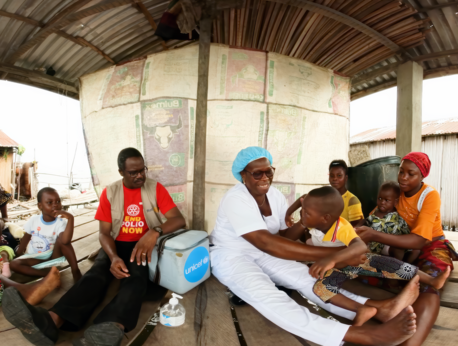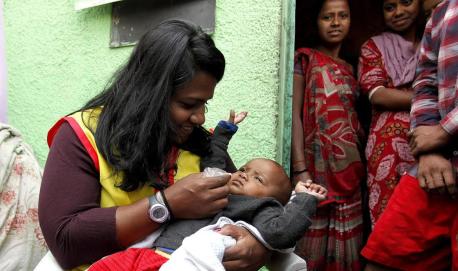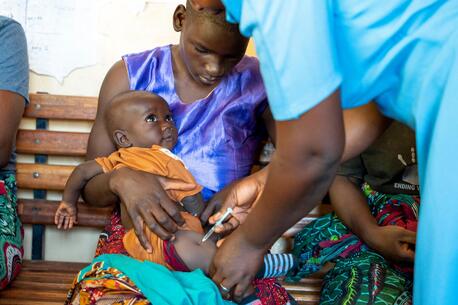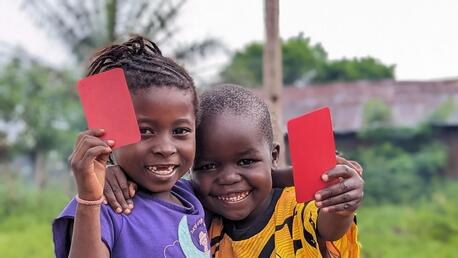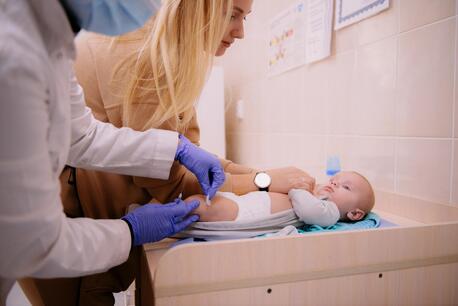
Parenting: All About Vaccines
An avalanche of misinformation and disinformation has created confusion about childhood immunization. Here are some answers to some frequently asked questions to help parents and caregivers get to the truth.
What are vaccines?
Vaccines are products that are usually administered during childhood to protect against serious, often deadly diseases. By stimulating the body’s natural defenses, they prepare it to fight off disease faster and more effectively.
How do vaccines work?
Vaccines help fight off infections by sparking the immune response to specific diseases; and then later, if and when there is exposure to the virus or bacteria, that response is triggered.
Why should I vaccinate my child?
Vaccines save lives.
UNICEF estimates that vaccines save the lives of 2 to 3 million children every year.
Vaccines help protect children against diseases that can cause serious harm or death — especially in infants whose immune systems are still developing. They are the first line of defense against measles, diphtheria, whooping cough (pertussis), tuberculosis, hepatitis, flu, polio, respiratory virus and cervical cancer.
There are also vaccines that protect against COVID-19. The rapid development of COVID vaccines and their application to more than two-thirds of the world's population has saved an estimated twenty million lives.
Are vaccines safe?
Vaccines have been in use for decades and have been proven extremely safe.
Your child is far more likely to be hurt by a vaccine-preventable disease than by a vaccine.
All vaccines go through rigorous safety testing, including clinical trials, before they are approved for the public. Countries will only register and distribute vaccines that meet rigorous quality and safety standards.
Extensive studies and research show that there is no evidence of a link between vaccines and autism.
Can my baby handle multiple vaccines?
Yes.
Many parents worry that multiple vaccines will overload their child’s immune system. But as the U.S. Centers for Disease Control points out, vaccines contain only a tiny fraction of the antigens children encounter every day in their natural environment. A common cold or sore throat will put a greater burden on your child’s immune system than vaccines.
A child won't be harmed by several vaccinations, even if given on the same day.
How do I know which vaccines my child needs and when they should be vaccinated?
Visit CDC.gov for a list of which vaccines your child needs and at what age. You can also ask your child's pediatrician.
Can I delay my child's vaccine schedule?
Delaying or spreading out the times your child is immunized can leave your child unprotected and vulnerable to disease.
What are the side effects of vaccines?
Serious side effects are rare. Almost all sickness or discomfort following vaccination is minor.
Sometimes there is redness or soreness at the injection site, or a mild fever. These are almost always temporary and can often be controlled by taking over-the-counter pain medication as advised by a doctor, or applying a cool cloth to the injection site.
Why do some people refuse to vaccinate their children?
Vaccine misinformation and disinformation have made some parents hesitant to get their children immunized. A 1998 study linking the MMR (measles mumps, rubella) vaccine to autism caused a huge vaccine scare but the study was later retracted after the lead author was found to have falsified data. Other, later studies that were more rigorous have found no evidence of any link.
Still, the anti-vaccination movement has continued to gain traction, causing the number of unvaccinated toddlers to skyrocket. In 2019 the World Health Organization listed vaccine hesitancy as one of the top threats to global health. The COVID-19 pandemic saw a further drop in global immunization rates for infants, the lowest in more than a decade.
Do vaccines contain harmful ingredients?
Ingredients like ethylmercury, aluminum, gelatin, human serum albumin, formaldehyde, antibiotics, egg proteins, and yeast proteins can be found in some vaccines and have caused concern that they may harm children who get vaccines containing these ingredients.
Unless your child is allergic to these ingredients, they pose no danger. The formaldehyde used to produce some vaccines, for example, is in an amount smaller than what is produced in our bodies naturally.
Those who have egg allergies should tell their doctor before getting a flu or yellow fever vaccine as they can contain egg proteins. They may be able to get a vaccine free of the allergen.
What is herd immunity?
If enough people in your community are immunized against a certain disease, you can reach something called herd immunity; when herd immunity is achieved, diseases can’t spread easily from person to person because most people are immune.
For measles, for example, a 95 percent rate is needed to prevent person-to-person spread and ensure herd immunity. If reached, it can prevent transmission, and helps protect people who can't be vaccinated — newborn babies and those with compromised immune systems. Outbreaks are prevented, and the disease becomes increasingly rare, sometimes disappearing entirely from the community.
Can I rely on herd immunity to protect my unvaccinated child?
No. If an infected person enters a community, those who aren't vaccinated are susceptible.
Whether your community has achieved herd immunity or not, ensuring that you and your children are fully vaccinated is the best protection against infectious disease.
In the U.S., mass vaccination has successfully created herd immunity — not only for measles but many other diseases, including polio, smallpox, diphtheria and rubella. But when immunization levels have dropped, diseases like measles have come back — even though the U.S. was officially declared measles free decades ago.
As measles outbreaks continue to occur in other countries, there is always a risk of importation — measles coming into the U.S. from somewhere else. Infectious diseases do not respect borders.
The important thing to note here is that when a person infected with measles comes into a community where a high proportion of people are vaccinated, the risk of an outbreak is very small. But if that community has larger numbers of unvaccinated people, then cases can surge.
Can I let my child get the chickenpox instead of getting the vaccine?
Although chickenpox is a mild disease that many parents will remember from childhood — the vaccine was introduced in 1995 — some children will develop serious cases with complications that can be fatal or cause permanent disabilities. The vaccine eliminates the risk of complications from the disease and prevents children from infecting their siblings, friends and classmates.
How can I make getting a shot less stressful for my child?
Parents and caregivers can help prepare a child for vaccination following a few simple steps:
Validate their feelings; listen and empathize. Explain why it's important to get vaccinated. Tell them they are brave for doing their part to keep themselves and others healthy.
Practice at home beforehand. Go through the motions and explain that they might feel a slight temporary pinch when getting the shot.
Bring an item that brings comfort like a book, blanket or favorite toy.
Speak to the health professional who administered the shot about possible side effects and what to do to ease them, such as applying a cold compress to the injection site.
Pay extra close attention to your child for a few days afterward to make sure that they aren’t doing or feeling anything out of the ordinary — and if they are, call the doctor for advice.
Learn about how UNICEF supports child immunization globally.


